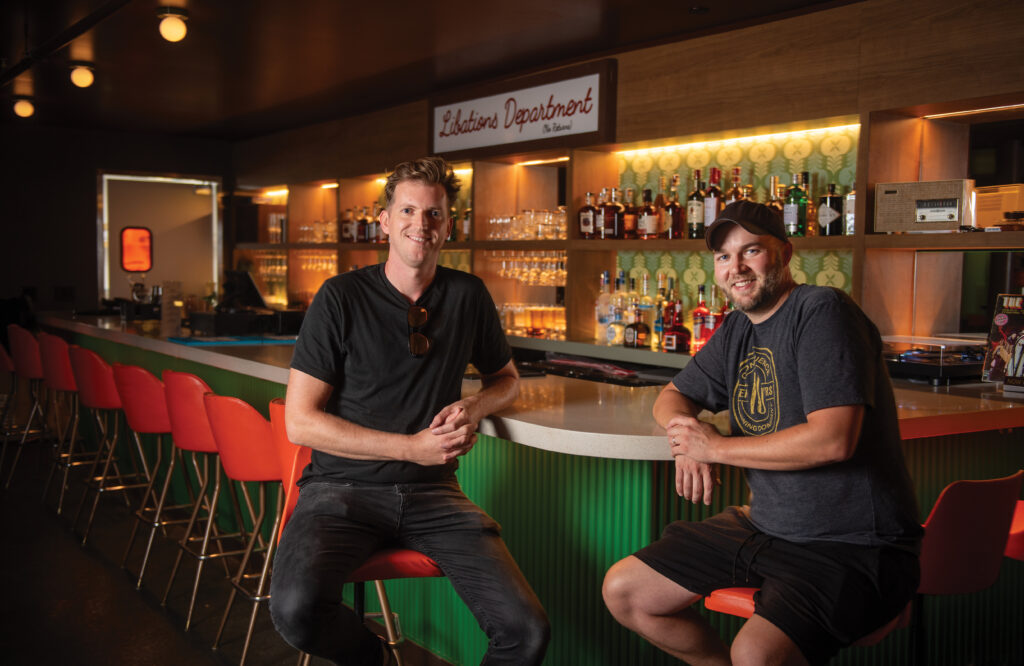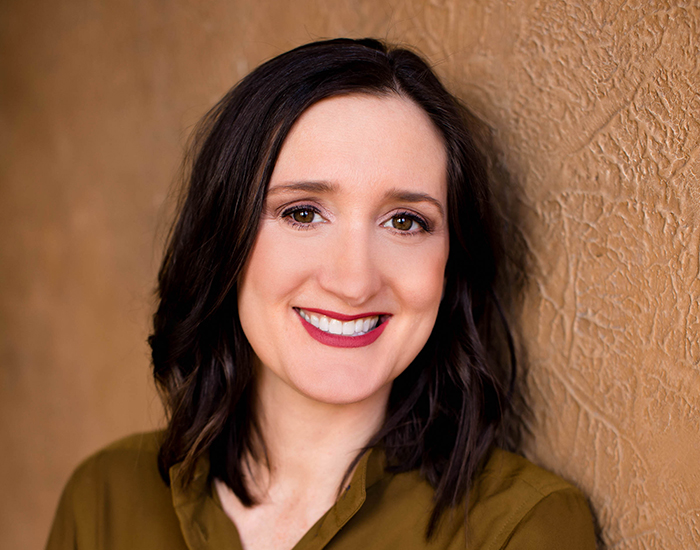Jennifer Cooper | Real estate professional of the year

The deal that placed banker Jennifer Cooper in the center of the public eye might have been one of the most complicated of her 30-year-career, but probably not the most interesting.
Cooper is the Business Record’s 2019 Commercial Real Estate Professional of the Year. She is a vice president and the manager of commercial real estate for Bankers Trust, where she has been since September 2004. Her banking career started in 1990 with the former Norwest Bank, which later became Wells Fargo & Co.
Cooper was the public face of Bankers Trust when the complicated – a stranger to finance might say convoluted – loan and payback structure for the city’s long-sought convention center hotel first emerged in 2015.
The hotel is a landmark project. At one time, it involved an esoteric federal program that provides visas for the children of wealthy foreign nationals who provide funds for economic development projects. That financing disappeared when Bankers Trust, in true risk management mode, wanted the federal investment on the table before it jumped in with construction financing.
Cooper was among a team at Bankers Trust that put together the construction loan that included participation from six other Iowa lenders. She will tell you there was an “unsung hero” of the deal — Gary Buelt, a senior vice president and the bank’s chief risk officer.
“He’s a huge part of why I’ve been able to be successful here,” Cooper said. “He’s consistent, he’s rational. I know what he’s going to be OK with. Knowing what I can do, when I’m out there in the thick of it or talking to somebody, it makes a huge difference.”
‘In the thick of it’
The loan for the construction center hotel was significant, yet Cooper has brought other deals to the table that have been groundbreaking or just plain interesting.
In her early days at Bankers Trust, she secured $20 million for financing in Waterloo on the back of a napkin. Once she had the borrower’s pertinent information — no debt, lots of assets and cash — she called former Bankers Trust President and CEO Michael Earley and got the loan approved, all during a luncheon meeting.
She has helped a local commercial real estate firm broker a deal for a 1950s Cold War bunker.
“I saw it before they cleaned it up. It was like a time warp; it was like time stood still,” Cooper said. “They still had posters on the walls, generators on springs. It could withstand like a 250-megaton blast. It was a bizarre property, probably the most funky.”
The groundbreaking loan led to the rehabilitation of Arlington and Hallett apartments at 13th and Locust streets, a project that was key to the transformation of the Western Gateway.
A little background is in order. The Des Moines Development Corp. had acquired the property in the late 1990s as one of several parcels it planned to hold for redevelopment of the area. The apartment buildings, built in the early 1900s, were slated for demolition.
Jodi Beavers and Leslie Gearhart, two developers and renovators who operated as Metropolitan Holdings, wanted to save the buildings. Their broker was Jake Christensen — the 2018 Commercial Real Estate Professional of the Year — and he put them in touch with banker Jennifer Cooper, who worked for Wells Fargo at the time.
She also was financing the group trying to raze the structures.
While many city leaders supported plans to tear down the buildings, businessmen Jim Cownie and Bill Knapp sided with Beavers and Gearhart. In a complicated ownership and refinancing structure, the Des Moines City Council had to approve the sale to the women.
“We were at the council meeting and I was in the background trying to hide because that was a situation where I was on both sides of the deal,” Cooper said.
On a motion by former Councilwoman Christine Hensley, the Council voted 4-3 to approve the sale. Councilman Chris Coleman also voted in favor of the deal.
Cooper put together a participation loan with four other banks that limited Wells Fargo’s exposure to the point she had authority to approve the package on her own.
Saving the apartments “will be one of the best legacy stories of downtown redevelopment,” Cooper said.
A path to banking
Cooper graduated in 1990 with a degree in finance from Arizona State University and went to work for Norwest Bank immediately afterward.
In doing so, she “broke the heart” of one of Iowa’s most liberal governors and U.S. senators, Harold Hughes, her stepfather.
In 1987, Cooper’s mother, Julie, married Hughes, for whom she had worked for several years after being recommended by the late Ed Campbell, a former Fort Dodge neighbor.
By the time of the marriage, Hughes was operating drug and alcohol rehabilitation centers, and that work became the focus of much of Cooper’s college work.
In all, she attended five colleges as the family moved around the country, primarily between Iowa, Arizona and Pennsylvania.
“We had a treatment facility in the mountains outside of Pittsburgh, in the Allegheny mountains. So he had me doing intake on heroin addicts out of Pittsburgh, and then running group counseling stuff,” Cooper said. “I was totally over my head, but I learned a lot. And I think one of the reasons I didn’t stay in the business was that we had an adolescent part of our treatment facility back then. And so many of those kids would go through the 30 days or whatever it was at the time and then they would leave and a huge majority would end up overdosing and dying. To disconnect from that was really, really tough.”
When the family arrived in Phoenix, Cooper enrolled at Arizona State and left a possible psychology major behind.
“Finance was a much more sedate kind of thing,” she said. “I had my psych degree just done. I was really just down to electives. And I think I just wanted to find [something different].”
Cooper credits her ability to be a good listener — key to being a good banker — to Hughes.
“He’s a magnetic kind of guy. It was just fascinating. If anything, he taught me how to truly listen to people because he could wax poetic for a long, long time,” she said. “But the great stories; I look back now and think, ‘You dumb 18- or 19-year-old, you should have written all of that stuff down, the great stories of the Kennedys and Lyndon Johnson and how things were back then.’ ”
Hughes encouraged her to take over operation of a diner that was for sale.
“Harold was just a big proponent of owning your own business,” Cooper said. She described the experience as a “disaster.”
“While I loved the man, working for him was all-encompassing. He would dictate a lot of things. So it was time to go off on my own and not have Harold directing my entire life,” she said.
She graduated from Arizona State and took a job with Norwest Corp. in Des Moines.
“I broke his heart when I joined those damn bankers. How could I do that?” Cooper said.
‘One of those fate things’
Cooper started out in the credit division at Norwest. She had been in the job for six months when her supervisor broke her pelvis in a bicycle accident. Cooper then led the division.
“I was 22 years old and had a bunch of analysts that I was managing. Yeah, it was it was kind of one of those fate things,” Cooper said. “And so instead of just doing a year of credit training, I did three years of it for both the Des Moines banks for Norwest and all of the banks statewide.
“I really got to see every deal, you know, year in, year out for quite a while.”
Within a short time, she was moved to commercial real estate. She was surprised — “It was so bizarre,” she said — but maybe shouldn’t have been.
“I was trained in loan operations, workout loan review, how to do documentation. You literally went to every single part of the bank for four months at a time and learned all those pieces. So in retrospect, I had an extremely good foundation from the Norwest training program,” Cooper said.
By 1998 Norwest — at the time the 11th-largest banking operation in the country — had finished its acquisition of Wells Fargo. The Wells Fargo name was better known and was retained for the new operation.
Cooper said it became more difficult to do commercial real estate loans because decisions that had once been made in Iowa were coming from San Francisco, where the bank moved its headquarters.
While still with Wells Fargo, she was a lender for Regency, at one time the state’s largest homebuilder. She gained the confidence of Regency founder Michael Myers after basically outlasting him during a four-hour meeting to gain his business. Things had not gone so well for the previously lender to visit Myers and ended with him “basically being thrown out of the office,” Cooper said.
“I really tried to listen, and maybe this was a Harold thing. I’m trying to listen to what what you really want to accomplish,” Cooper said. “Banking is a risk mitigation business. I mean, we have to, at the end of the day, protect our our depositors and our shareholders. I mean, but how how can you do that and have the marriage of what the client wants with how to protect the bank. And it’s that balancing of those factors that I think is the art form of the whole thing — it is to make everybody feel like they won in the end.”
She said the long meeting with Myers “pretty much sealed my fate with him and Ron Daniels and Abe Wolf and a lot of different clients because they just knew I would take the time to listen to what needed to happen to work for them. And I think I’m also pretty quick to say if it’s something they want that we can’t do, I try to say ‘no’ pretty quickly as well. We try not to drag it out into a slow ‘maybe.’ ”
Daniels, president of Buyers Realty, is among several prominent Greater Des Moines commercial real estate professionals who wrote letters supporting Cooper for Commercial Real Estate Professional of the Year.
Cooper is “highly principled, very positive, and extremely personable,” he said.
To Bankers Trust
Cooper tired of Wells Fargo and left the bank. She was a commercial mortgage broker for a time and earned her Certified Commercial Investment Member certification at the urging of real estate appraiser Gene Nelsen.
Since joining Bankers Trust in 2004, she has maintained and monitored a portfolio of more than 45 investor-developer clients with more than $700 million in commitments and has helped to build a commercial real estate portfolio of more than $2 billion.
Cooper consistently originates more than $125 million in new loans a year, generating annual fee income of more than $2 million.
“Jeni is by far the most knowledgeable person in our community when it comes to commercial real estate lending,” Bankers Trust President and CEO Don Coffin said.
She also is an active volunteer and credits former Councilwoman Hensley with encouraging her to volunteer her time and talents.
“Chris Hensley far and away has been my biggest supporter of giving me those opportunities to be on other boards,” Cooper said. She currently serves on the Iowa Economic Development Authority board and chairs its due diligence committee. She also serves on the boards of the Iowa Housing Partnership and H.O.M.E. Inc.
For Cooper, it all boils down to being a good listener, and that makes for a good banker.
“People want to just know they’re dealing with a real person,” she said. “I’m probably not a very formal banker; I’m just direct about things, which I think people appreciate. Nobody wants to waste time.”










